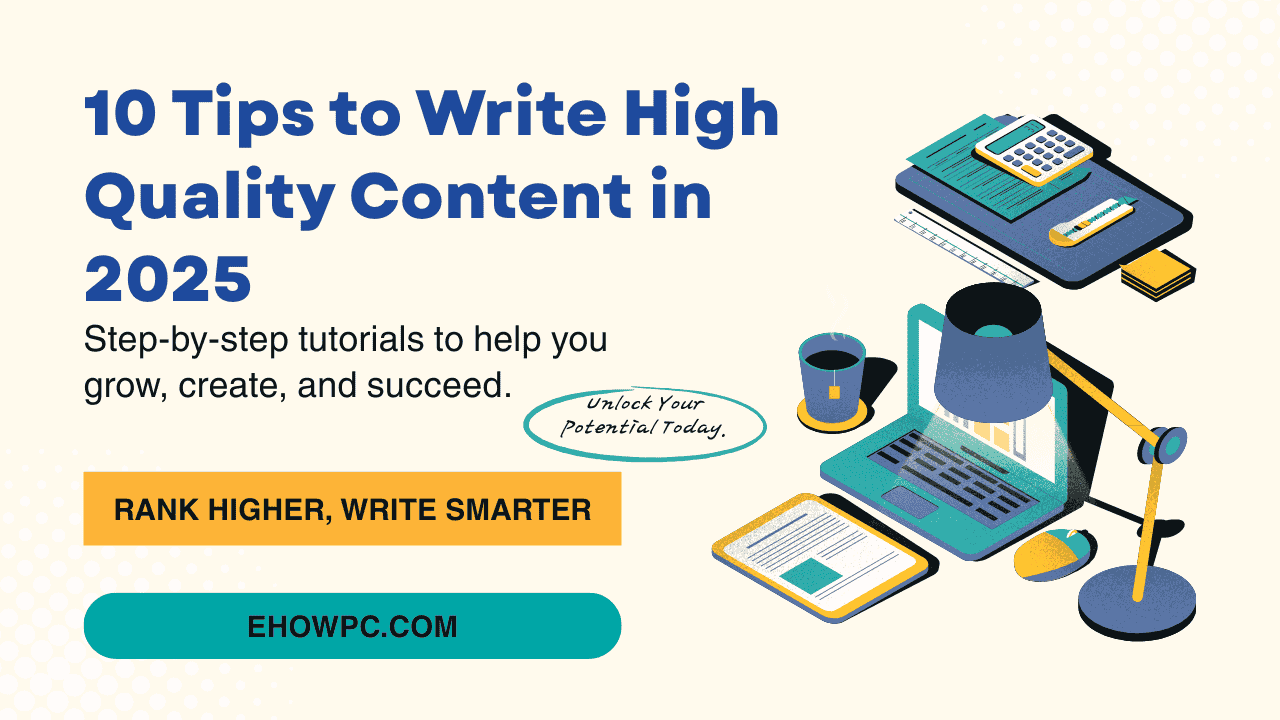Introduction
Learn how to write high quality content is the foundation of digital success in 2025. To stand out in today’s crowded online competition for rankings, you need more than just good writing you need content that is user focused, valuable, and optimized for search intent. With Google’s evolving algorithms favoring Google rank content that is original, authoritative, and well-structured, creators must balance creativity with data driven SEO practices. In this guide, you’ll discover 10 essential tips to craft content that not only engages readers but also ranks higher in search results. From keyword placement to user experience, every tip is designed to help you meet Google’s content standards while delivering real value to your audience.
Table of Contents
What Defines High Quality Content?
Quality content is content that meets the needs of its audience while providing value. It should be informative, well-structured, engaging, and easy to read. But what does this really mean?
- Informative: It answers the questions the audience is searching for and provides relevant, in-depth answers.
- Well-structured: It is logically organized, with a clear flow of information, and utilizes formatting like headings, bullet points, and short paragraphs.
- Engaging: It keeps the reader’s attention through interesting facts, examples, or storytelling.
- Easy to read: The language is simple, and the content is presented in digestible chunks.
But more than just writing well, it needs to align with SEO best practices to perform well on Google.
How Google Rank Content: What You Need to Know
Google’s ranking system is based on several factors, but at the core, it evaluates content quality using algorithms that focus on relevance, authority, and user experience. Here’s how it works:
1. Relevance to Search Intent
Google prioritizes content that matches the searcher’s intent. Whether they are looking for answers to a question, solutions to a problem, or information on a specific topic, your content must satisfy their needs. Google can detect if content aligns with what a user is searching for based on keywords, structure, and overall clarity.
2. E-A-T (Experience, Expertise, Authoritativeness, and Trustworthiness)
Google uses the E-A-T principle to assess the credibility of the content. Articles from trusted sources are ranked higher because they are seen as more valuable.
- Experience: The content should come from someone with personal or professional experience with the subject.
- Expertise: Content from recognized experts or individuals with relevant credentials will rank better.
- Authoritativeness: Content from reputable and authoritative sources will have a better chance of ranking highly.
- Trustworthiness: Content should come from a reliable and transparent source. Sites with clear contact information and secure connections (HTTPS) tend to rank higher.
3. Content Freshness
Google rewards content that is regularly updated, especially for topics that evolve quickly (such as technology or health). Keeping your articles up to date shows Google that your site is active and relevant.
4. User Experience (UX)
Google now places a huge emphasis on user experience. A page that loads quickly, is mobile-friendly, and has an intuitive design will rank higher. Google also considers engagement metrics, such as time spent on a page, bounce rates, and how often users share the content.
5. Backlinks and Social Shares
The more authoritative sites link to your content, the higher Google will rank it. Backlinks from respected sources act as endorsements. Similarly, content that gets shared frequently on social media signals to Google that it’s valuable and trustworthy.
How High-Quality Content Helps Your SEO
Writing high-quality content isn’t just about being helpful or informative. It plays a crucial role in your SEO strategy. Here’s how:
1. Better Keyword Rankings
When you create content that addresses the specific needs of your audience, you’re more likely to rank for relevant keywords. Content that uses keywords naturally and effectively—without stuffing—can improve your rankings in Google’s search results.
2. Increased Organic Traffic
SEO-focused content that answers questions or solves problems can drive organic traffic. With proper keyword research, you can create content that targets the terms people are actually searching for, ensuring that your site appears when it matters.
3. Lower Bounce Rates and Higher Engagement
Well-written, engaging content will keep visitors on your page longer, which lowers your bounce rate—a factor that impacts SEO. When users engage with your content, spend more time on your site, or share it, Google takes this as a sign that your content is valuable and ranks it higher.
4. Boosted Trust and Authority
Content that is clear, accurate, and well-researched builds trust with both users and Google. By becoming a reliable source of information, you can build domain authority, which is key for ranking well in search engine results.
Mastering the Art in 2025: Essential Strategies for SEO Success
Now that you understand the importance of quality content and how Google ranks articles, let’s dive into the top tips for creating content that will not only engage your readers but also boost your SEO.
1. Focus on User Intent
Understanding search intent is critical. If your audience is looking for solutions, ensure your content provides answers, solutions, and clear instructions. If they’re looking for information, provide valuable insights. Always ask yourself: “What does my audience want to know?”
2. Invest in Keyword Research
Effective keyword research ensures your content targets the right search terms. Tools like Yoast SEO or Ahrefs help identify popular keywords and search volume. Incorporate these naturally into your content, and don’t forget to use LSI (Latent Semantic Indexing) keywords to improve relevance.
3. Write with E-E-A-T in Mind
Ensure your content adheres to the principles of E-E-A-T (Experience, Expertise, Authoritativeness, and Trustworthiness). Share personal experiences, reference trusted sources, and be transparent about your credentials. If your content lacks authority, it’s unlikely to rank well.
4. Make Content Scannable
Users don’t always read every word. Make sure your content is scannable by using headings, subheadings, bullet points, and short paragraphs. This enhances the user experience, making it easier for people to find what they need quickly.
5. Include Internal and External Links
Internal links help guide readers to other valuable content on your site, while external links to credible sources improve your authority. Use both strategically to enhance SEO and user engagement.
6. Ensure Mobile Optimization
In 2025, more than half of all searches are conducted on mobile devices. Your content must be mobile-friendly to ensure a positive user experience and to meet Google’s mobile-first indexing.
7. Optimize for Featured Snippets
Featured snippets are the boxes of content that appear at the top of Google’s search results. Aim to structure your content in a way that increases your chances of appearing in these coveted spots. Short, concise answers to common questions are key.
8. Regularly Update Content
Keep your content fresh and relevant by updating it regularly. Google loves fresh content, and updated posts are more likely to rank higher, especially for topics that evolve over time.
9. Leverage Visuals for Engagement
Adding images, videos, and infographics to your content can increase user engagement and time on page. These elements help break up the text and make your content more visually appealing.
10. Track and Analyze Performance
Use tools like Google Analytics and Search Console to track how your content is performing. Regularly analyze metrics such as traffic, bounce rates, and conversions to see what’s working and where improvements are needed.
Bonus: Check Out the Best SEO Tools for 2025
To supercharge your content and improve your SEO efforts, check out this detailed guide on the 10 Best SEO Tools for 2025. These tools will help you optimize your content, track keyword rankings, and monitor your website’s performance, ensuring your content gets the attention it deserves.
Conclusion
Writing high-quality content is both an art and a science. It requires understanding what your audience needs, crafting content that addresses those needs, and optimizing it for SEO. By following these tips, you can ensure that your content is not only engaging and informative but also ranks highly on Google. Stay on top of trends, optimize for user experience, and keep your content fresh to maintain your competitive edge in 2025 and beyond.


Thanks for the tips but can you share any specific trick to boost page rank. Will appreciate for that effort.
Can i have any specific free tools list for SEO purpose because all of the listed are some how paid versions. Is there any 100 free version available?